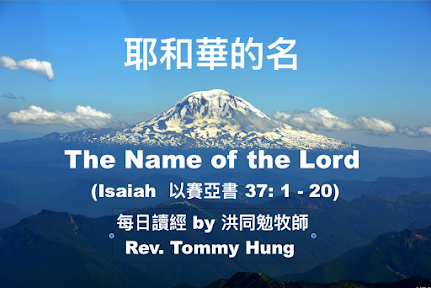在信靠和祈禱之中安靜鎮定, 等候耶和華顯明祂是神
Pray faithfully, be still, and wait on the Lord to reveal that He is God.
耶和華的名
The Name of the Lord
讀經 : 以賽亞書 卅七1~20
Scripture Reading: Isaiah 37: 1 - 20
釋義: 本段聖經的特色是充滿對話: 希西家派臣子對以賽亞說話(1-4);以賽亞回覆希西家的臣僕(5-7);亞述王對希西家的恐嚇(8-13);希西家向耶和華禱告(14-20)。其中尤其特別的是希西家一頭一尾的說話:他都是進到聖殿去(1,14),但是信心的表現卻截然不同。
Insight: This passage is characterized by its large amount of dialogues: Hezekiah sent his officers to speak to Isaiah (1-4); Isaiah responded to Hezekiah’s servants (5-7); king of Assyria’s threat to Hezekiah (8-13); Hezekiah prayed to the Lord (14-20). Among all the conversations, Hezekiah’s use of words in the beginning and the end were especially remarkable: In either scenarios, he went up to the house of Lord (1,14); but the faith he displayed was strikingly different.
開始時, 希西家第一次進入聖殿, 自己沒有禱告, 卻託人請以賽亞代求。看來他信心軟弱, 重複稱神為以賽亞「你的神」(3)。在王下十八14-16這件事的平行記載中, 希西家那時將國庫及聖殿的金銀進貢給亞述, 甚至刮下殿柱的包金, 湊足貢銀。可見一個敬畏神的賢君,也有信心軟弱的時刻。他對神的心是誠實無偽的, 但是他的外交政策似乎太軟弱, 不能與信仰協調。
In the beginning, the first time Hezekiah went up to the temple he himself did not pray, but sent someone to ask Isaiah to pray on his behalf. Apparently, he was spiritually weak, referring to God as “your God”, i.e., Isaiah’s God (3). In the parallel account of this event in 2 King 18:14-16, Hezekiah paid Assyria tribute from the treasuries of the royal temple and the gold and silver found in the temple; he went as far as stripping the gold that covered the doorposts of the temple in order to produce the promised amount. It is evident that a good king who feared God could have moments when he felt spiritually weak. His faithfulness to God was genuine, but his foreign policy was weak, unable to stay in step with his faith.
然而本段結束時, 希西家的屬靈景況截然不同。希西家將亞述使臣的書信拿進聖殿, 展示給神看(14); 這個動作是求神伸張公義。這次希西家親自向神禱告, 而對神的稱呼(15-17)與第一段有天淵之別。希西家稱呼神為:
Yet at the end of the passage, Hezekiah showed a completely different spiritual condition. Hezekiah took the letter from the Assyrian messengers to the temple and spread it before God (14); the intent of this action was to ask God to uphold righteousness. This time Hezekiah himself prayed to God; the way he addressed God (15-17) here and at the beginning were as different as night and day. Here Hezekiah called God:
- 坐在二基路伯(即寶座)上;
Enthroned above the cherubim (i.e. throne);
- 萬軍之耶和華;
Lord of hosts;
- 以色列的神;
God of Israel;
- 天下萬國的神;
God of all the kingdoms of the earth;
- 獨一無二創造主宰;
You alone have made heaven and earth;
- 永生的神
The living God
並求神因西拿基立的所作所為拯救國難, 外邦諸神乃木石所做, 故不是神, 不能施救, 唯獨神是「永生的神」, 可以施救援, 使天下萬國都知道祂的確是真神(18-20)。希西家的禱告, 言詞優美, 心誠懇摯,動人肺腑。
And he pleaded with God to deliver the nation for Sennacherib’s doing, pointing out that: The foreign gods are made from wood and stone, and therefore, they are no gods and unable to provide deliverance; God alone is the “living God” who can save them, so that all the kingdoms know that He alone is the Lord (18-20). Hezekiah’s prayer was beautiful, genuine, and touching.
幾年前明報記者林洵訪問諾貝爾得獎者楊振寧時, 提出十個問題。其中一個是: 「你認為有沒有造物主?」楊巧妙圩回答: 「這個宇宙的一切實在太美妙了。如果有造物的話, 那一定是祂刻意的安排。」
During an interview with Nobel Prize winner Chen-Ning Yang several years ago, Ming Pao reporter Lin Xun posed 10 questions. One of them was: “Do you believe there is a Creator who creates all in the universe?” Professor Yang answered ingeniously, “Everything in this universe is so wonderful. If there is creation, He must have an ultimate goal in mind.”
諸天述說神的榮耀; 穹蒼傳揚祂的手段。(詩十九1)
“The heavens declare the glory of God, and the sky above proclaims His handiwork.” (Psalm 19:1)
問題有沒有神, 而是你認識祂是怎樣的神, 你怎樣稱呼祂? 你和祂的關係怎樣?
The question is not whether God exists but what you know about Him. What do you call Him? How is your relationship with Him?
每日讀經 by 洪同勉牧師 Rev. Tommy Hung

No comments:
Post a Comment